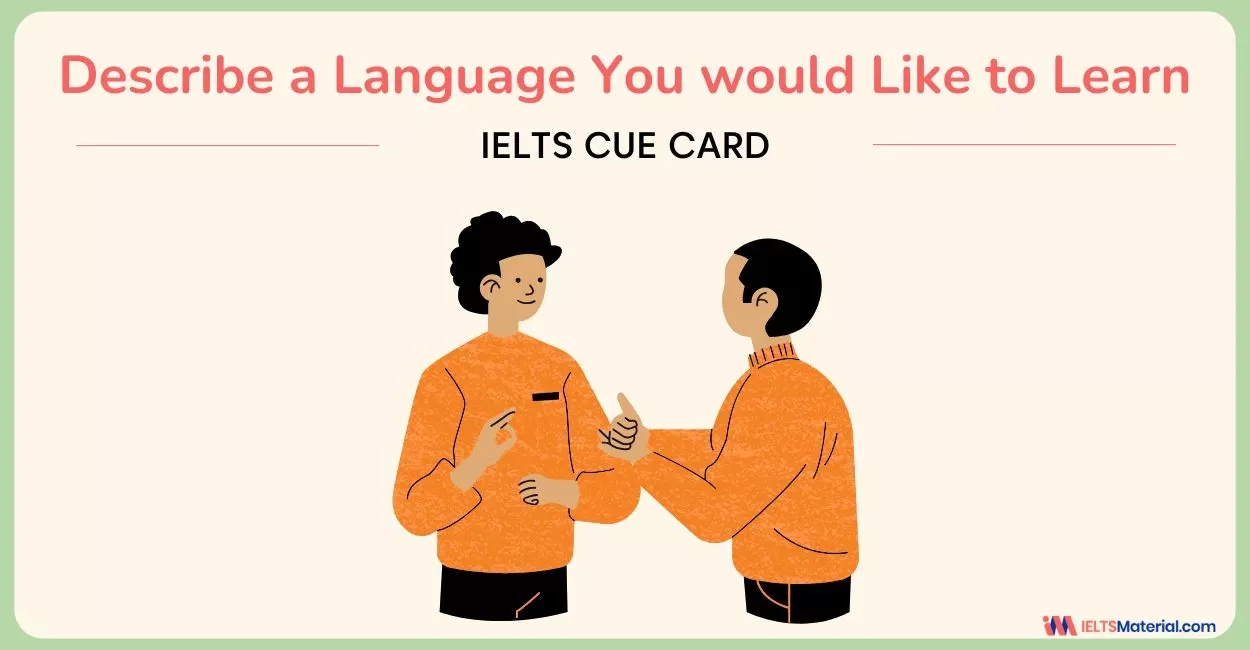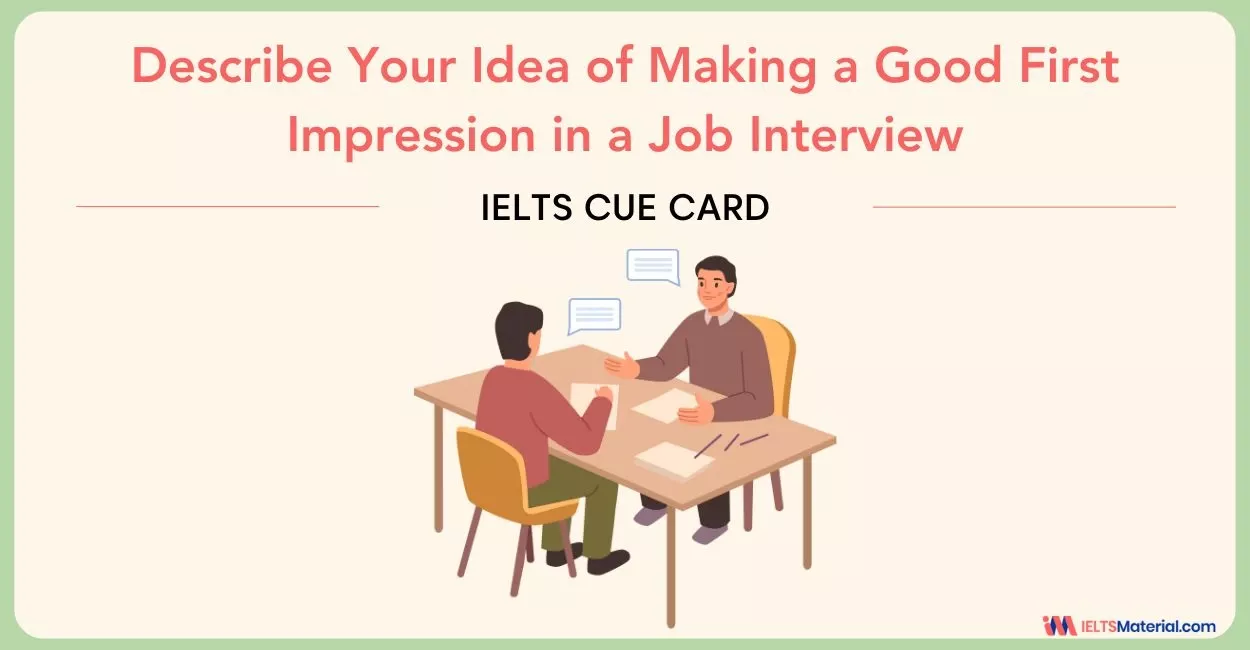Describe Your Idea of Making a Good First Impression in a Job Interview - IELTS Speaking Part 2 & 3
Go through the sample answers for the IELTS cue card, ‘Describe your idea of making a good first impression in a job interview,’ here. Also, explore the Part 3 questions & answers, IELTS vocabulary for speaking, and achieve your desired band score of 9.
Table of Contents
- Work/Job IELTS Speaking Part 1: Common Questions & Band 8+ Answers
- Describe Your Idea of Making a Good First Impression in a Job Interview IELTS Speaking Part 2 Question & Sample Answers
- Vocabulary You Can Use For IELTS Speaking Part 2 Questions on Describe Your Idea of Making a Good First Impression in a Job Interview
- Describe Your Idea of Making a Good First Impression in a Job Interview IELTS Speaking Part 3 Question & Sample Answers
- Vocabulary You Can Use For IELTS Speaking Part 3 Questions on Describe Your Idea of Making a Good First Impression in a Job Interview

Get a Complimentary IELTS Speaking Strategies PDF
First impressions often set the tone for future interactions. In job interviews as well as Part 1 of the IELTS Speaking exam, those first few minutes can either make or break your chances. Therefore, preparing how to describe your idea of making a good first impression in a job interview is essential. This topic helps examiners evaluate your ability to articulate personal opinions, experiences, and practical advice fluently while demonstrating appropriate grammar, vocabulary, and coherence.
Therefore, in this blog, we have provided three high-scoring sample answers for ‘Describe Your Idea of Making a Good First Impression in a Job Interview’, which will guide you on how to prepare a cue card for IELTS Speaking. They, along with some relevant Part 3 questions and answers and a list of useful work vocabulary, will help you prepare for other similar topics.
Work/Job IELTS Speaking Part 1: Common Questions & Band 8+ Answers
The ‘Work’ topic is a frequent theme in IELTS Speaking Part 1. Given below are some common questions that you can prepare. They will guide you on how to respond confidently and naturally using high-level vocabulary.
- Do you work or study? What is your job?
- What are your responsibilities?
- Why did you choose that job?
- Is there some other kind of work you would rather do?
- Describe the company or organization you work for.
- Do you enjoy your work/Is it an interesting job?
- What do you like/dislike about your job?
- (Possibly) Do you miss being a student?
- Did you always want this job?
- Where do you want to see yourself in 10 years?
- What do you do after work?
For the answers to the above Work Part 1 questions, check out: Job/Work: IELTS Speaking Part 1
Describe Your Idea of Making a Good First Impression in a Job Interview IELTS Speaking Part 2 Question & Sample Answers
In IELTS Speaking Part 2, you are allotted exactly one minute for preparation before speaking on the given cue card topic. It might be difficult for you to frame your Band 8+ answer if you are not prepared on how to answer IELTS Speaking Part 2 effectively.
So, explore the sample answers to describe your idea of making a good first impression in a job interview cue card that will help you score better in IELTS Speaking Part 2.
Describe your idea of making a good first impression in a job interview.
You should say :
- Why it is important?
- Is it important to make a good last impression as well?
- What ways would you do it in your job interview?
- And explain how to make a good first impression in a job interview.
Describe Your Idea of Making a Good First Impression in a Job Interview - Sample Answer 1
It is common sense that most people at my age are now seeking good job opportunities. Thus, I have to get to know how to leave a good first impression in a job interview. Today, I would like to share with you some of my knowledge about this topic.
In a professional situation, first impressions are significantly important. Most job interviews don’t last more than 45 minutes. In such a short period of time, from those who don’t know anything about us, we have to persuade them that we are qualified enough for the position we applied for. Thus, a good first impression can help to increase the success rate in our application process.
There are many things a candidate can do to create a positive first impression. You may follow these tips, such as arriving on time for the interview, dressing formally, and using appropriate ways of behaviour and communication. Besides, there are some noted points that you should pay much attention to, like the job description and company information that you acquired through research. By going through the required tasks and skills for the vacancy, the company’s culture, or giving some suggestions to improve the productivity of the tasks you might be in charge of when you take that position, you can help yourself stand out from other candidates. For me, I would choose to follow all the tips above.
Apart from the first impression, I strongly believe that last impressions are important as well. Often we are not accepted immediately in the interview. The recruiting team will have to take into account all candidates’ performances during the interview to choose the most suitable ones for the position. Therefore, first impressions alone are not enough; we have to build a strong relationship with recruiters by making a good last impression too. By doing so, we show our respect to the recruiters and the job we apply for.
Being in a job interview is not an enjoyable experience. However, we have to get through it to pursue our dream jobs. Thus, we should prepare well enough for occasions like that.
Feeling unsure of yourself while practicing IELTS Speaking topics?
Book a FREE Demo to learn from experts!
Describe Your Idea of Making a Good First Impression in a Job Interview - Sample Answer 2
The first impression you make on others will undoubtedly have a long-term impact on how people see you. This judgement is amplified during job interviews, which are aimed to ensure your personal and professional fit inside an organization. In a brief amount of time, you must persuade the interviewer, who doesn’t know anything about you, that you are well-suited to the role you have applied for. As a result, making a strong first impression can help you enhance your chances of success.
Similarly, when you are leaving the company for a new position, you want to maintain a good relationship with your previous employer, as they are part of your professional network and can aid you in the future.
I always do a lot of in-depth research for my interviews beforehand. I try to be self-assured but not arrogant. I also take care to respond to questions thoughtfully and organically. It’s good to truly listen to the questions being asked and avoid delivering formulaic answers. It is also essential to dress appropriately. Clothing and style reveal far more about a person than most people realize.
My advice to anyone who is nervous about an interview is to be calm and approach it as an opportunity to grow, not like a test. If you’re friendly, approachable, and sincere, then you’re sure to make a positive impression on anyone.
Boost your IELTS Speaking score with expert guidance—join our online webinar now!
Vocabulary You Can Use For IELTS Speaking Part 2 Questions on Describe Your Idea of Making a Good First Impression in a Job Interview
Given below is the list of words related to the topic, Describe Your Idea of Making a Good First Impression in a Job Interview IELTS cue card, that will expand your latest IELTS Speaking vocabulary to boost your score.
|
Word/Phrase |
Meaning |
Example Sentence |
|---|---|---|
|
Be of common sense |
Something that is widely known or accepted |
It is of common sense to maintain eye contact during a job interview. |
|
Go through |
Study or examine something carefully |
Before my interview, I went through the company’s website and recent press releases. |
|
Vacancy |
A job that is available for someone to do |
I applied for a vacancy in a multinational marketing firm. |
|
Stand out |
To be noticeably better or more impressive than others |
Her confidence and communication skills made her stand out during the panel interview. |
|
Take into account |
To consider or remember something when judging a situation |
Interviewers take into account both qualifications and personal presentation. |
|
Get through |
To successfully deal with a difficult situation |
Staying calm helped me get through my initial interview anxiety. |
|
First impression |
The initial perception people form about someone |
Your first impression during a job interview can define your future in that company. |
|
Professional fit |
How well someone suits the company’s culture and expectations |
The panel was assessing my professional fit for the client-facing role. |
|
Self-assured |
Confident and relaxed without being arrogant |
Being self-assured during the interview helped me speak clearly and confidently. |
|
Approach it as |
Treat or think about something in a particular way |
I approached the interview as a chance to show my enthusiasm and learn. |
|
Dress appropriately |
Wear suitable clothing for the context |
It's crucial to dress appropriately for formal job interviews. |
|
In-depth research |
Thorough and detailed investigation or study |
I did in-depth research to understand the company's values and mission. |
|
Formulaic answers |
Predictable or rehearsed responses |
Avoiding formulaic answers can make your responses sound more authentic. |
|
Positive impression |
A favorable opinion or feeling created by someone's words or actions |
Smiling and being respectful left a positive impression on the interviewer. |
Describe Your Idea of Making a Good First Impression in a Job Interview IELTS Speaking Part 3 Question & Sample Answers
IELTS Speaking Part 3 is designed to test your ability to discuss abstract ideas, express opinions clearly, and support them with reasons, examples, and comparisons. If the cue card was about a personal experience, like making a good first impression in a job interview, Part 3 will explore the broader social, cultural, and professional implications of that topic.
So, let us explore some Part 3 questions related to work/job and the cue card, Describe Your Idea of Making a Good First Impression in a Job Interview.
1 Which jobs would you say are most respected in your country?
Well, I have never thought about this, but I reckon that professional careers such as the fields of law, education, and medicine may be the most highly-acclaimed ones. It is mainly because people working in these fields can easily earn lucrative income compared to others.
2 Some people say it’s better to work for yourself than be employed by a company. What’s your opinion?
Well, I used to be a full-time employee & felt very stressed. To be specific, most of the time, I had a hectic schedule & was up to ears in heavy workloads to meet deadlines. Therefore, although running my own business is really challenging, I do feel far more comfortable with it.
3 What changes in employment have there been in recent years in your country?
As far as I know, more and more people, especially the young generations are involved in setting up their own businesses. Thus, the “start-up” community is now more alive than ever, especially tech startups.
4 What are some of the important things a candidate should find out before accepting a job?
Well, this is an interesting question. If I were offered a job, I would definitely go through the company’s compensation package such as salary, allowances, maternity or paternity leave, insurance, pension plans, vacations, etc. Also, I’d need to know about my area of responsibilities so that I can make sure that I will not be overwhelmed with heavy workloads down the road.
5 Why are first impressions so important in job interviews?
First impressions are important because they help form an initial judgment about a candidate’s professionalism and suitability. Interviewers are often under time pressure, and their initial perception can influence how they interpret your responses. So, a positive start can help build rapport and confidence throughout the interview.
6 How important is body language in making a good impression?
Body language plays a pivotal role. Positive body language, like sitting up straight, making eye contact, and nodding when appropriate, conveys confidence and attentiveness. In contrast, slouching or avoiding eye contact may signal disinterest or insecurity, even if your answers are well-prepared.
7 Can virtual interviews impact first impressions differently?
In online interviews, elements like video quality, background setting, and digital etiquette affect first impressions. As a result, speaking clearly, dressing professionally, and maintaining visual contact with the camera can help replicate the positive impact of an in-person interview.
Want a comprehensive package for IELTS Speaking preparation?
Check out the IELTS Speaking Band 8 Preparation Course with FREE ebooks!
Vocabulary You Can Use For IELTS Speaking Part 3 Questions on Describe Your Idea of Making a Good First Impression in a Job Interview
Let’s explore a list of IELTS work vocabulary that have been used in the above sample answers.
|
Word/Phrase |
Meaning |
Example Sentence |
|---|---|---|
|
Highly-acclaimed |
Widely praised or recognized for excellence |
She applied for a job at a highly-acclaimed consulting firm in London. |
|
Lucrative |
Producing a lot of profit or financial gain |
Many candidates are drawn to lucrative roles in the tech industry. |
|
Hectic |
Extremely busy or full of activity |
Interviewers often have a hectic schedule, making first impressions even more critical. |
|
Deadlines |
Specific times or dates by which tasks must be completed |
Due to tight deadlines, employers tend to form opinions quickly during interviews. |
|
Go through |
To examine carefully or methodically |
Recruiters go through dozens of CVs before selecting a shortlist for interviews. |
|
Overwhelmed |
Feeling unable to cope due to too many demands or emotions |
Some applicants feel overwhelmed during virtual interviews due to unfamiliar formats. |
|
Start-up |
A young business venture, often in the tech or innovation sector |
She got her first job at a promising start-up that focused on AI solutions. |
|
Pivotal role |
An essential or critically important function |
Body language plays a pivotal role in establishing trust during interviews. |
|
Initial judgment |
The first evaluation or opinion formed about someone |
Employers often make an initial judgment based on appearance and mannerisms. |
|
Professionalism |
The competence or skill expected of a professional |
Demonstrating professionalism is key to leaving a lasting impression. |
|
Suitability |
The quality of being right or appropriate for a specific purpose or role |
The interview aimed to assess my suitability for the leadership position. |
|
Rapport |
A positive and trusting relationship |
Building rapport early in the interview helps create a comfortable atmosphere. |
|
Attentiveness |
The quality of being observant, focused, and responsive |
Nodding and maintaining eye contact show attentiveness. |
|
Digital etiquette |
Appropriate and polite behavior during online communication |
Practicing good digital etiquette is essential for remote job interviews. |
|
Visual contact |
Looking at the camera to simulate eye contact in virtual settings |
Maintaining visual contact during a video call mimics real-life connection. |
To conclude, making a good first impression is as essential in a job interview as it is during the IELTS Speaking test. In both scenarios, how you present yourself, verbally and non-verbally, speaks volumes. Therefore, practice expressing your personal approach clearly and confidently with IELTS Speaking practice tests, and you will be ready for success, both in the test room and the boardroom.
Useful Links:
- 10 Useful IELTS Speaking Tips to Impress the Examiner
- 50 Recent IELTS Speaking Topics 2023 Part 2 & 3 with Model Answers
- What IELTS Examiners Look for in the Speaking Test?
- Recent IELTS Topics in IELTS Speaking Tests 2025
- How to Use Idioms in IELTS Speaking for a Higher Score?
- How to agree and disagree in IELTS Speaking? - Vocabulary, Questions and Phrases
Explore IELTS Speaking

Bonus IELTS Speaking part questions with Answers
Explore other Speaking Part 2 Topics


Kasturika Samanta

Kasturika Samanta
Recent Articles
Haniya Yashfeen

Kasturika Samanta

Kasturika Samanta






Post your Comments
1 Comment